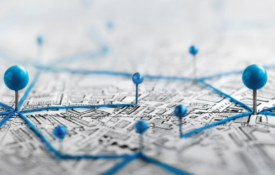-
The Happy Patriot, the Unhappy Nationalist
"I love the man that can smile in trouble, that can gather strength from distress, and grow brave by reflection,” Thomas Paine wrote in his pamphlet series The American Crisis. It was December 1776, shortly after the onset of the war for independence, and Paine was contemplating the purpose and promise of patriotism in building a new nation free of British overreach. A happy patriot, in his view, was one who drew strength and joy even from the nation—especially under adverse circumstances. Nearly 250 years later, few would argue that the United States has not recently seen adversity, including extreme political polarization, civil unrest, the coronavirus, and more.
-

Handwriting Beats Typing and Watching Videos for Learning to Read
There is something intrinsically satisfying about crafting a handwritten thank-you letter or jotting down a thoughtful note to a friend or loved one. With the advent of electronic correspondence, handheld texting, and voice-recognition software, handwriting
-
Could Power Increase the Chances of Men Cheating? Here’s What Science Says About It
Men in power like Bill Clinton, Mark Sanford, David Letterman, Tiger Woods, and many others have all engaged in extramarital affairs that caused quite a buzz when their issues of infidelity came out. According to Terri Orbuch, both men and women cheat in which 32% of married men and 20% of married women admitted to having cheated on their spouses. However, powerful men were often most notable because of the power and influence they hold. But the question there is: why do these men in power with such pivotal professions and important responsibilities commit adultery? What motivates them to risk it all for a fling?
-
The Pandemic Did Not Affect Mental Health the Way You Think
You’ve probably heard that the coronavirus pandemic triggered a worldwide mental-health crisis. This narrative took hold almost as quickly as the virus itself. In the spring of 2020, article after article—even an op-ed by one of us—warned of a looming psychological epidemic. As clinical scientists and research psychologists have pointed out, the coronavirus pandemic has created many conditions that might lead to psychological distress: sudden, widespread disruptions to people’s livelihoods and social connections; millions bereaved; and the most vulnerable subjected to long-lasting hardship. A global collapse in well-being has seemed inevitable.
-
‘Lucky’ Golf Items Might Actually Work, According to Study
The U.S. Open is back at Torrey Pines this week, for the first time since the most memorable moment of my life as a golf fan: Tiger Woods, sporting a broken leg and a one-shot deficit, draining a slippery 12ft birdie putt to send the contest into a playoff. If he missed, the tournament would be over, with Rocco Mediate crowned your 2008 U.S. Open champion. But this is Tiger Woods we’re talking about. I still can’t believe this putt actually went in. Putts like this don’t go in for any one reason. It’s a combination of technical brilliance, mental acuity, overall skill, God-given talent, and a little bit of luck.
-

Faulty Memories of Our Past Whereabouts: The Fallacy of an Airtight Alibi
New research published in Psychological Science reveals that our recollections of our past whereabouts are often imperfect.

